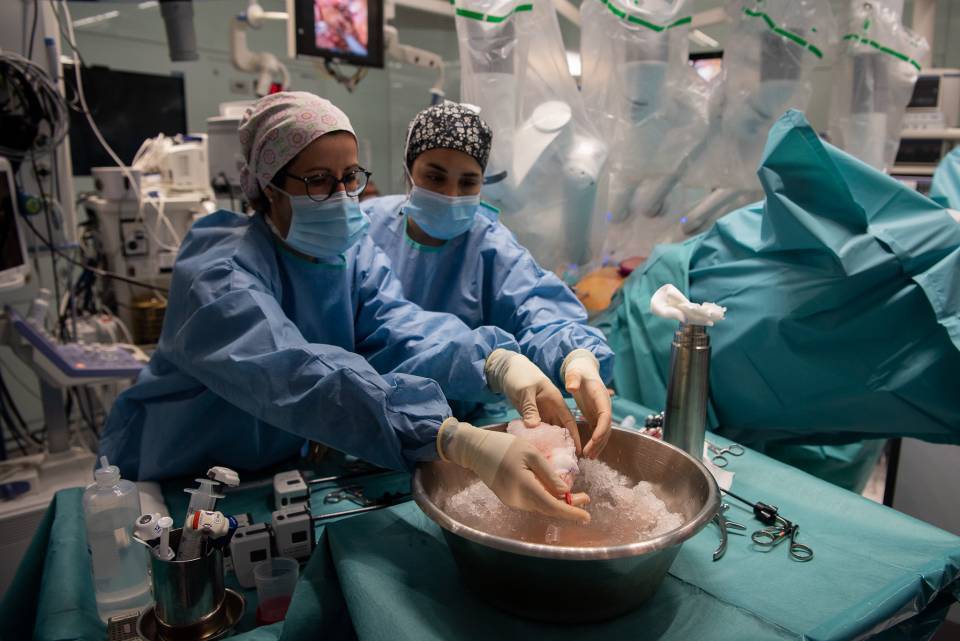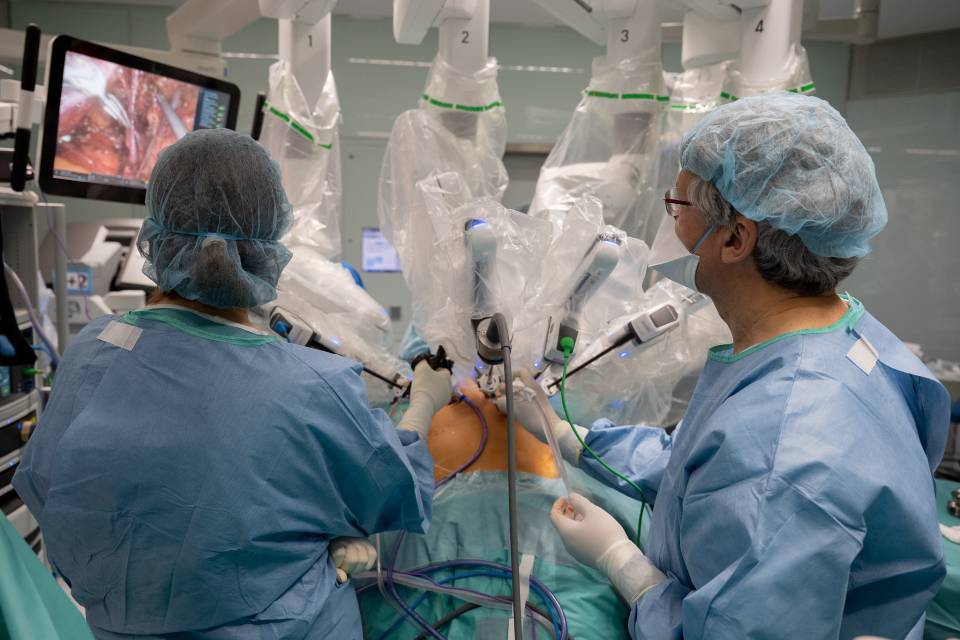Assistence - General and Digestive Surgery Service
The enormous explosion of medical knowledge and the rapid development of new technologies in recent decades have made it essential to develop subspecialties in order to keep up with advances and acquire the necessary experience. In this context, the General and Digestive Surgery Department is divided up into various sections, each dedicated to subspecialties within our discipline. Professionals participate in these sections either exclusively or jointly, ensuring specialized and up-to-date care.
Hepato-Pancreato-Biliary Surgery and Transplantation Section
Our Department offers surgical treatments for benign and malignant diseases of the liver, pancreas, bile ducts, and gallbladder. The Hospital Clínic de Barcelona is one of the centres in the country that performs liver and pancreas operations using the traditional open method and minimally invasive operations, including laparoscopic, robot-assisted, and endoscopic procedures. Minimally invasive surgeries allow for faster recovery and are indicated in pancreatic cancer surgery, bile duct resections, and complex liver resections.
Liver transplantation is part of the treatment for severe chronic liver disease or liver cancer. The philosophy of the Department is to provide liver transplantation services and surgical options to all patients who may benefit from them, including those who may have been considered high risk or unsuitable for transplantation by other transplant centres in the country. The General and Digestive Surgery Department works closely with hepatology specialists to provide a multidisciplinary approach to liver diseases that may require transplantation.
The Department has extensive experience in combined pancreas and kidney-pancreas transplants, which are performed in conjunction with specialists from the Urology, Endocrinology, Nephrology, and Anaesthesiology Departments. It is one of the most active and experienced transplant programmes in the country.
Colorectal Surgery and Peritoneal Oncology Surgery Section
The General and Digestive Surgery Department pioneered the introduction of minimally invasive surgery in the treatment of colorectal cancer in the 1990s. The members of this section have extensive experience in laparoscopic and robot-assisted surgery for malignant and benign colorectal pathology, including diverticular disease and inflammatory bowel disease.
Our Department is also one of the three leading centres in Catalonia for the treatment of peritoneal carcinomatosis using cytoreductive surgery and hyperthermic intraperitoneal chemotherapy (HIPEC). This is a complex pathology that requires a multidisciplinary approach, in which the role of medical oncologists, radiologists, pathologists, pharmacologists, and many other specialists is essential in order to provide the best benefits to each patient in an individualized manner.
The members of the Colorectal Surgery Section also work in collaboration with other specialists to diagnose and treat anorectal diseases and pelvic floor disorders. The main reasons for consultation are anal fissures and haemorrhoids, both internal and external, although these are not the only diseases treated in this field. A wide range of diseases are also treated, including anal fistulas, complex perianal Crohn's disease, anal cancer, anal prolapse, faecal incontinence, and many other conditions. For all of these, an individualized diagnosis and minimally invasive treatment are performed.
Oesophago-gastric and Bariatric Surgery Section
Our Department performs surgical treatments for benign and malignant diseases of the oesophagus and stomach, such as gastro-oesophageal reflux, para-oesophageal hernias, achalasia, and oesophageal and stomach cancer. These procedures can be performed using minimally invasive surgery as part of a multidisciplinary treatment. In the case of oesophageal cancer, our centre is one of four hospitals in Catalonia where this activity is concentrated as part of the centralization programme of the Catalan Oncology Master Plan.
Obesity surgery aims to improve the patient's health and prevent comorbidities associated with this disease, such as high blood pressure, diabetes, and obstructive sleep apnoea. In this area of care, each patient is assessed individually and the appropriate treatment is prescribed for each one. A multidisciplinary group of professionals consisting of surgeons, endocrinologists, dietitians, and psychologists participates in the treatment of obesity. Currently, there are several surgical techniques, such as gastric bypass, tubular gastrectomy, and duodenal switch, which are performed laparoscopically and robotically in our Department. This minimally invasive approach avoids some complications associated with a large incision and those resulting from prolonged immobility.
General and Endocrine Surgery Section
The General Surgery Section is dedicated to the treatment of surgical pathology of the endocrine system, abdominal wall, soft tissue tumours, as well as Major Outpatient Surgery. The members of this section treat patients who require surgery on the thyroid and parathyroid glands, as well as the adrenal glands. The specialists in this section also treat, together with other specialists from different internal and external departments, soft tissue and retroperitoneal tumours, such as sarcomas, as well as melanomas that require complex surgical resection.
With regard to abdominal wall surgery, the conditions treated include hernias, postoperative eventrations, significant abdominal wall defects requiring separation of components, and complex surgeries. Solutions are also provided for problems caused by complications from other surgical procedures, such as infections and necrosis of the wall, or the removal of intolerable meshes. In this field, priority is given to the use of minimally invasive techniques to minimize pain and hospital stays, allowing patients to return to their normal lives in the shortest possible time.
Patients with uncomplicated abdominal and biliary wall disease, among other conditions, can be treated with minimally invasive surgery, which allows for a less painful postoperative period and discharge on the same day as the surgery. The Hospital Clínic's Major Outpatient Surgery facility is located at the Plató Site.
General Surgery Emergency Department
The Emergency Surgery Section is an essential component of the General and Digestive Surgery Department, responsible for the immediate and specialized care of patients who require urgent or emergency surgery due to conditions affecting the digestive system, abdominal wall, and other related pathologies. The Department's specialists work with other professionals to provide continuous care for surgical emergencies 24 hours a day. Thirty percent of the procedures performed in our Department are urgent, which demonstrates the importance of this section.
Its primary function is to care for patients with urgent surgical conditions, such as appendicitis, intestinal obstructions, peritonitis, abdominal trauma, strangulated hernias, among others. If the diagnosis requires intervention, the section's team, as well as the members of the on-call teams, are trained to perform emergency surgery, either minimally invasive or conventional, depending on what is most appropriate for the patient and their condition.
The section works closely with other medical departments such as anaesthesiology, radiology, gastroenterology, and nursing to offer comprehensive treatment and coordinate patient care in an optimal manner. In addition, constant contact is maintained with the ICU units and other hospital areas for patients who may require specialized post-surgical care.
In addition to organizing and carrying out healthcare activities through the five sections, the members of the Department work in coordination with the following multidisciplinary units and committees:
- Medical-Surgical Endocrine Pathology Working Group
- Multidisciplinary Colorectal Cancer Committee
- Multidisciplinary Oesophago-gastric Cancer Committee
- Multidisciplinary Committee on Biliopancreatic Cancer
- Multidisciplinary Committee on Peritoneal Carcinomatosis
- Multidisciplinary Committee for the Treatment of Obesity
- Multidisciplinary Committee on Pelvic Floor Disorders


